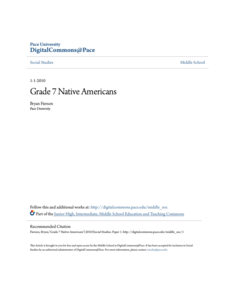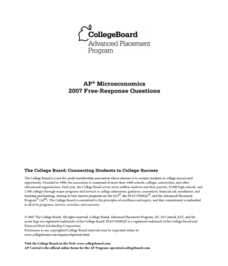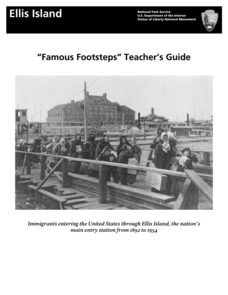Pace University
American Revolution
Young historians get hooked into a unit study of the American Revolution with a simulation that lets them experience some of the outrage colonists felt about unfair taxes. Class members demonstrate what they have learned in the study by...
National Endowment for the Humanities
The Declaration of Independence in Six Parts
Everyone knows that the Declaration of Independence is important, but what does it actually say? Members of American history classes analyze the Founding Fathers' arguments against British tyranny and for a more perfect union with a...
Pace University
Native Americans
Introduce middle schoolers to the First Nations that inhabited the Northeast during the Age of Exploration with a series of activities designed for differentiated groups.
Benjamin Franklin Tercentenary
Many Bens: Character Revealed in Writing
Benjamin Franklin may be known as a Founding Father, but he was also a prolific writer. Scholars examine his better-known pieces to learn about genre, voice, and early American history. The resource includes options for various...
National WWII Museum
The War in the Pacific by the Numbers
It may be difficult to quantify the cost of war, but an informative resource shows learners the toll of the Pacific campaign during World War II. From the number of presidents who served during the war (two) to the square feet of a...
State of Victoria Department of Education and Early Childhood Development
The Long Wall of China
While some aspects of the Great Wall of China are known, other parts of its story are obscured by time. A research lesson asks scholars to consider what we know and don't understand about this wonder of the world. The class then compiles...
Benjamin Franklin Tercentenary
Join, or Die: Reenacting the Albany Conference
The Albany Congress was one of the first attempts at colonial unity. While it was an effort against the French during the French and Indian War, it was one of the events leading up to the American Revolution. Scholars consider the...
State of Victoria Department of Education and Early Childhood Development
The Great Wall of China
The Great Wall of China is a wonder of the world. Learners explore the history and construction of the incredible feat using both non-fiction and fictional works. The resource includes multi-day lesson plans that contains ideas for...
Benjamin Franklin Tercentenary
Simple Machines, Ben Franklin and the Technology of the 1700s
Benjamin Franklin was an inventor, and he was fascinated by the mechanics of machinery. Using a fun exploration, pupils examine simple machines from the pre-Industrial era. Then, they must identify and build their own using common objects.
Americans All
A Simulation: The Peopling of America
What was it like to pass through Ellis Island? Learners move through the immigration process of the early 1900s in a simulation activity. A comprehensive activity includes role-playing profiles and other manipulative items such as...
Benjamin Franklin Tercentenary
Franklin’s Philadelphia: Another Point of View
While Benjamin Franklin enjoyed fame and success in colonial Philadelphia, that was not the experience of all coming to the British colonies. Young scholars trace the life of an indentured servant using a scholarly biography and reading...
Benjamin Franklin Tercentenary
What Good May I Do: Franklin and the American Civic Association
Benjamin Franklin may have been a Founding Father of the United States, but he also founded a number of civic associations. Learners explore his legacy using a biographical essay and collaborative activity. After their exploration,...
Benjamin Franklin Tercentenary
Lists to Live By: Developing a Self-Improvement Plan
Ben Franklin was a man with a plan. Learners investigate his plan for self-improvement using excerpts from Franklin's autobiography. Then, pupils develop their own plans and discuss how to sell them to others using the two-session lesson...
Prairie Public Broadcasting
Egyptian Pyramids Virtual Field Trip!
A virtual field trip takes enthusiastic travelers to the pyramids of Giza. Using Google, scholars explore the grounds of the ancient pyramids found in Egypt then complete three worksheets: a photo analysis page, a reflection sheet, and a...
College Board
2007 AP® Microeconomics Free-Response Questions
A monopoly gives a company exclusive rights to a market. What is the impact of that decision on the economy? Problem sets from College Board explore this question, as well as variables in labor markets and government regulations on profit.
National Park Service
“Famous Footsteps” Teacher’s Guide
As part of a study of Ellis Island Immigration Station, class members assume the role of immigration service workers, investigate the dossier of an immigrant, and recommend whether or not their subject should be allowed to enter the US....
Newspaper Association of America
Celebrating Women’s History Month
Examine the lives of four women—Blanche Stuart Scott, Madeleine L'Engle, Margaret Evans Price, and Sybil Ludington—in a 23-page activity packet. Each profile comes with a set of vocabulary and reading comprehension questions. Further...
Penguin Books
An Educator’s Guide to Ruta Sepetys
Historical fiction novels give readers a chance to step into someone else's shoes. An educator's guide from Penguin Common Core Lesson Plans provides resources to accompany three historical fiction novels written by Ruta Sepetys: Between...
Penguin Books
An Educators' Guide to Between Shades of Gray by Ruta Sepetys
Books can help teens understand complex global issues. A helpful educator's guide introduces readers to what it's like to be a refugee. Lesson components for the novel Shades of Gray include an anticipation guide and writing and...
Penguin Books
Core Curriculum Lesson Plans for The Lions of Little Rock
Schools in the 1950s and 60s looked very different from the schools we know today. An educator's guide explores the civil rights movement and, specifically, the process of integrating schools. Questions cover key themes in the novel and...
Judicial Learning Center
Your Day in Court: Criminal Justice
When a person goes on trial for a crime, what options does a court have to render justice? Who are the key players in the legal system? Interested legal scholars answer the inquiries and more using an Internet-based activity, chart, and...
Judicial Learning Center
The Judge and the Jury: Trial by Jury
Why is it so important to have a trial by jury in the American judicial system? This right is one of the hallmarks of American democracy, but it also comes with the responsibility of serving on a jury if called. Young legal scholars...
Judicial Learning Center
Judicial Independence: What’s Wrong with This Court?
Why is it important for judges to operate independently of politics or other branches of government? Scholars ponder the question as they examine video clips, case studies, excerpts of the US Constitution, and an interactive computer...
Judicial Learning Center
Understanding the Types of Cases
Most young scholars are aware of the criminal courts system, but the United States Constitution allows for a much broader role. What other roles do courts play in settling other questions? A case study and WebQuest-style activities...























